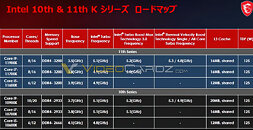Wednesday, January 27th 2021

Intel "Rocket Lake-S" i9-11900K, i7-11700K, and i5-11600K Specs Confirmed, Native DDR4-3200 Support
A leaked marketing slide from MSI Japan confirmed specifications of three 11th Gen Core "Rocket Lake-S" desktop processors that gamers and enthusiasts have their eyes on—the flagship Core i9-11900K, the next-best Core i7-11700K, and the performance-segment Core i5-11600K. The slides confirm that both the i9-11900K and i7-11700K are 8-core/16-thread parts, while the i5-11600K is 6-core/12-thread. With the "Rocket Lake-S" die capping out at 8 cores, Intel's product managers have lesser wiggle room to segment the Core i7 part from the Core i9 flagship.
The i9-11900K comes with a base frequency of 3.50 GHz, Turbo Boost 2.0 frequency of 5.10 GHz, Turbo Boost Max 3.0 frequency of 5.20 GHz, and Thermal Velocity Boost frequency of 5.30 GHz. Its all-core boost frequency is 4.80 GHz. The i7-11700K, on the other hand, lacks TVB. It ticks at 3.60 GHz base, 4.90 GHz Turbo Boost 2.0, and 5.00 GHz Turbo Boost Max 3.0. The i5-11600K lacks Turbo Boost Max 3.0 and TVB, it does 3.90 GHz base, with 4.90 GHz Turbo Boost 2.0. The Core i9 and Core i7 parts are joined at the hip with not just identical core counts, but also the same amount of L3 cache, at 16 MB. The i5 comes with 12 MB. All three Unlocked "K" SKUs come with native support for DDR4-3200 memory frequency, and their TDP is rated at 125 W. Intel is expected to launch these processors by late-March, 2021.
Source:
VideoCardz
The i9-11900K comes with a base frequency of 3.50 GHz, Turbo Boost 2.0 frequency of 5.10 GHz, Turbo Boost Max 3.0 frequency of 5.20 GHz, and Thermal Velocity Boost frequency of 5.30 GHz. Its all-core boost frequency is 4.80 GHz. The i7-11700K, on the other hand, lacks TVB. It ticks at 3.60 GHz base, 4.90 GHz Turbo Boost 2.0, and 5.00 GHz Turbo Boost Max 3.0. The i5-11600K lacks Turbo Boost Max 3.0 and TVB, it does 3.90 GHz base, with 4.90 GHz Turbo Boost 2.0. The Core i9 and Core i7 parts are joined at the hip with not just identical core counts, but also the same amount of L3 cache, at 16 MB. The i5 comes with 12 MB. All three Unlocked "K" SKUs come with native support for DDR4-3200 memory frequency, and their TDP is rated at 125 W. Intel is expected to launch these processors by late-March, 2021.

28 Comments on Intel "Rocket Lake-S" i9-11900K, i7-11700K, and i5-11600K Specs Confirmed, Native DDR4-3200 Support
Edit: In comparison to the i7 11700K
But in this case, we will have to see how Intel managed to control the thermal and power requirement. It still 14nm after all.
- You want to upgrade your LGA 1200.
- You hate AMD, and stuff like that.
- You don't know what to do with all your money.
- September is several days from now.
- You must have the latest, regardless.
- You love the smell of mature 14 nm in the morning.
- You need a new one since the FBI took your machine last week.
well, there are no bad products, just bad prices. I’ll take the 6 month wait and check in then. Hopefully cheaper than AMD (heh)
1. Priced below / comparable to AMD's offerings
2. You don't care about high power consumption/cooling requirements
3. You do care about a 4-5% increase in framerates
They really should have released a 10 core part for enthusiasts, who cares if it was a 150W part
Unless these are priced at $330-$350 and I can sell my current proc for at least $200 maybe... but even then I'm not even sure it's worth the effort. And Alder lake is a few months away...
This might be up there with the 7700K for the most pointless release ever, if the leaked gaming benches hold true.
The thing that doesn't make sense is why the 11700k has a 100mhz higher base frequency than the 11900k. That could be a typo.
What's not exciting is:
- Still on 14 nm (but yeah, we don't know what that means in terms of performance).
- Fewer cores (not an issue for everyone tho).
- Gets replaced within 6 months, kind of implying that Intel don't believe in it.
Nice. That's gotta be some really special architecture... oh wait, its not.Theoretically not. Practically? Whatever. They lost core count and frequency to end up 7% higher. Somebody explain the madness here, this is what a salvaged backport looks like. Not something that is meant to last.
They actually had to lose cores to get their performance at that clock, so what really happened here is they took another architecture way out of its comfort zone and maxed it within a very high TDP budget. Its so end-of-the-line already that they even run it for only six months. Even Intel doesn't believe in incrementally improving this. Their node just won't do more.
The fact they're still selling this as K-CPUs is the cherry on top, maybe they'll bundle a printout of the famous Intel forum post saying 'don't OC too much now'. Realistically all K stands for now is Intel already maxed out the clock for you, in the most scrapyard-style way they could. Burst to oblivion and boom back to baseclock. That's fine if you have thermal headroom, but when you don't...
Better off getting a i7 and Overclocking it
These should really blow out amd in gaming when paired with some 4000+ mhz memory.
The f*** inflammatory posts these days towards Intel is ridiculous.
Just wait for benchmarks, see where it lands and then move on.
Alder Lake, on the other hand, is much more interesting simply because it's replacing rocket so soon.Just like Intel! Cheers.